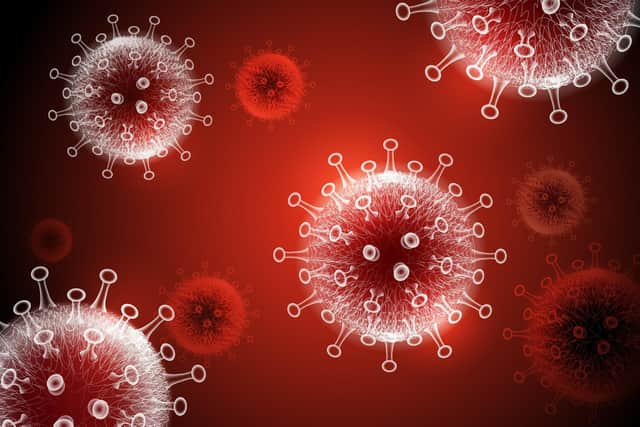Drug can help Covid-19 patients recover quicker, trial results suggest
and live on Freeview channel 276
Patients given remdesivir had a recovery time that was almost a third faster than those given a placebo, the first results from an international clinical trial showed.
Abdel Babiker, professor of epidemiology and medical statistics at UCL, told BBC Radio 4's Today programme: ‘These are very encouraging results from the first large-scale randomised trial to report on any treatment of Covid-19.’
Advertisement
Hide AdAdvertisement
Hide AdHe said the group of adults admitted to hospital with advanced coronavirus who received remdesivir recovered ‘much faster’ than the group that received a placebo.


Preliminary results also suggested a survival benefit, with a lower mortality rate of 8 per cent for the group receiving the drug, compared with 11.6 per cent for the placebo group, the National Institute of Allergy and Infectious Diseases (NIAD) said.
More than 1,000 patients have been recruited across the world, including 46 from the UK, for the Adaptive Covid-19 Treatment Trial, which began at the start of April.
Scientists involved in the study defined recovery as a patient being well enough to come off oxygen, being discharged from hospital or even returning to normal activity levels.
Advertisement
Hide AdAdvertisement
Hide AdDuring the trial, which involved more than 70 hospitals across the globe, patients were given the antiviral drug every day for 10 days while they remained in hospital.
Professor Mahesh Parmar, director of the Medical Research Council Clinical Trials Unit at UCL, who oversaw the EU portion of the trial, said scientists will continue to gather further data while the early results are reviewed by regulators.
Prof Parmar said: ‘These results are very promising indeed. They show that this drug can clearly improve time to recovery.
‘Before this drug can be made more widely available, a number of things need to happen: the data and results need to be reviewed by the regulators to assess whether the drug can be licensed and then they need assessment by the relevant health authorities in various countries.
Advertisement
Hide AdAdvertisement
Hide Ad‘While this is happening, we will obtain more and longer term data from this trial, and other ones, on whether the drug also prevents deaths from Covid-19.’
Professor Sarah Pett, professor of infectious diseases at the UCL trials unit, paid tribute to the co-operation between teams as they worked to deliver results quickly.
She said: ‘Delivering the results of the first stage of the ACTT study in such a short time is down to the dedication and hard work of the teams in the USA, at UCL, all of the hospitals who participated in this trial, and of course most importantly, the patients who agreed to participate.
Advertisement
Hide AdAdvertisement
Hide Ad‘The spirit of collaboration has never been stronger, in this time of urgent global need. The reward for all of us has been to provide data which suggests remdesivir helped the patients in the ACTT study recover more quickly. This is a foundation on which to build, and these findings will help other patients with Covid-19.’
A separate, smaller study in the Chinese city where coronavirus was first detected, found the drug did not speed up recovery or reduce deaths in people with Covid-19 compared with placebo in patients admitted to hospital.
That study, published in The Lancet on Wednesday, involved 237 adults from 10 hospitals in Wuhan.
But the authors said that, because the trial was stopped early, the true effectiveness of remdesivir remains unclear.
Advertisement
Hide AdAdvertisement
Hide AdProfessor Bin Cao, from China-Japan Friendship Hospital and Capital Medical University in China, who led the research, said it was not the outcome his team hoped for but recognised they were limited in the patients they could enrol.
The data safety monitoring board stopped the trial because researchers were unable to recruit enough patients following the steep decline of cases in China.
Remdesivir, which was originally developed to treat Ebola, is one of a handful of experimental drugs undergoing clinical trials worldwide to treat coronavirus.
Trudie Lang, professor of global health research at the University of Oxford, said the Chinese study being stopped showed the ‘limited window’ of when there were enough patients to carry out clinical research.
A message from the Editor
Thank you for reading this story on portsmouth.co.uk. While I have your attention, I also have an important request to make of you.
With the coronavirus lockdown having a major impact on many of our advertisers - and consequently the revenue we receive - we are more reliant than ever on you taking out a digital subscription.
Subscribe to portsmouth.co.uk and enjoy unlimited access to local news and information online and on our app. With a digital subscription, you can read more than 5 articles, see fewer ads, enjoy faster load times, and get access to exclusive newsletters and content. Visit our Subscription page now to sign up.
Our journalism costs money and we rely on advertising, print and digital revenues to help to support them. By supporting us, we are able to support you in providing trusted, fact-checked content for this website.
Comment Guidelines
National World encourages reader discussion on our stories. User feedback, insights and back-and-forth exchanges add a rich layer of context to reporting. Please review our Community Guidelines before commenting.